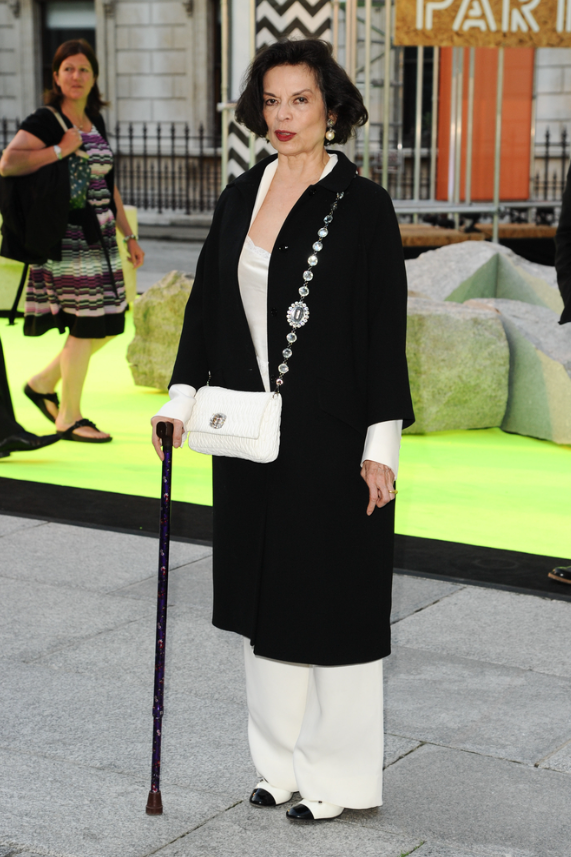
Mick Jagger is famously known for his romantic escapades, but during the 1970s, his marriage to his first wife, Bianca, captured significant attention. Curious about what Bianca is up to these days?
The Rolling Stones, established in 1962, have become an iconic presence in rock music. At 80, Mick Jagger remains a legendary figure, further cemented by being knighted by Queen Elizabeth II two decades ago.

Co-founding the band alongside Brian Jones, Charlie Watts, and Keith Richards, Jagger has seen many changes over the years. With Watts passing away in 2021 and Jones no longer with the band, the current lineup includes Jagger, Richards, and bassist Ronnie Wood, 76. They continue to tour and recently released “Hackney Diamonds”, their first album of new material in 18 years, featuring collaborations with stars like Paul McCartney, Stevie Wonder, and Lady Gaga.
Over the past six decades, Jagger’s fame has kept his personal life in the limelight, especially with his eight children. His eldest daughter, Karis, was born in 1969, and his youngest, Deveraux, was born in December 2016.

Mick married Bianca Pérez-Mora Macías in 1971 in a star-studded ceremony in Saint-Tropez. They welcomed their daughter, Jade, who is now 52 and known for her work in interior and jewelry design. Bianca became a socialite and was often in the news, notably for a legendary story about arriving at her birthday party on a white horse at Studio 54. She later clarified that it was a surprise orchestrated by Steve Rubell, co-founder of the club, inspired by a photo of her on a horse in Nicaragua.

While both Jagger and Bianca had affairs during their marriage, it ultimately led to their separation. Bianca filed for divorce after Mick briefly dated model Jerry Hall. Their divorce was finalized in 1978, with Bianca receiving a settlement of $1.2 million, as reported by New York Magazine. Reflecting on the split, she expressed to The Guardian that it felt like a failure, stating: “I was brought up Catholic, to believe that marriage is for life. And we failed”.
After her marriage ended, Bianca shifted her focus from partying to activism, championing the rights of vulnerable individuals through Amnesty International. Her efforts earned her the Right Livelihood Award, often referred to as the “alternative Nobel Prize”, in 2004 for using her fame to advocate for those in need.

Today, Mick Jagger is in a committed relationship with American choreographer Melanie Hamrick, 36. They have been together for a decade and share a son. Are you aware of Bianca Jagger’s remarkable humanitarian efforts? Share your thoughts in the comments! Feel free to pass this article along to anyone interested in where these rock legends are now!
We Adopted a 4-Year-Old Girl – A Month Later, She Came to Me and Said, ‘Mommy, Don’t Trust Daddy’

A month after adopting Jennifer, she looked up at me with wide eyes and whispered, “Mommy, don’t trust Daddy.” Her words echoed in my mind as I began to wonder what secrets my husband could be hiding.
I looked down at Jennifer’s small face, taking in those big, watchful eyes and the shy, uncertain smile she wore. After all those years of hoping, trying, waiting, here she was, our daughter.

A small happy girl | Source: Pexels
Richard was practically glowing. He couldn’t stop looking at her, like he was trying to memorize every feature, every expression.
“Look at her, Marla,” he whispered, his voice filled with awe. “She’s just perfect.”
I gave him a soft smile, my hand resting on Jennifer’s shoulder. “She really is.”

A happy family and their daughter | Source: Pexels
We’d come such a long way to get here. It had been doctor’s appointments, long talks, and an endless paperwork of adoption. When we finally met Jennifer, something in me just… knew. She was only four, so little, and so quiet, but she already felt like ours.
It’s been a few weeks since we’ve officially adopted Jen, and we decided it was time for a small family outing. Richard leaned down to her level, smiling warmly. “Hey. How about we go get some ice cream? Would you like that?”

A man talking to his young daughter | Source: Freepik
Jennifer looked at him, then glanced up at me, as if waiting for my reaction. She didn’t answer right away, just gave the smallest nod, pressing herself closer to my side.
Richard chuckled softly, though I could hear a hint of nervousness in it. “All right, ice cream it is. We’ll make it a special treat.”

A man playing with his daughter | Source: Freepik
Jennifer stayed close to me as we walked out. Richard led the way, glancing back every now and then and smiling hopefully. I watched him try to coax her out, to make her feel at ease. But each time he asked a question, Jennifer’s grip on my hand tightened a little, her gaze drifting back to me.
When we got to the ice cream shop, Richard stepped up to the counter, ready to order for her. “How about chocolate? Or maybe strawberry?” he asked, his voice bright.

A man picking out ice cream | Source: Midjourney
She looked at him, then looked at me again, her voice barely a whisper. “Vanilla, please.”
Richard seemed taken aback for just a second, then smiled. “Vanilla it is.”
Jennifer seemed content to let him order, but I noticed she barely looked his way as we sat down. Instead, she ate quietly, staying close to my side. She watched Richard with a cautious sort of interest, not saying much, and I wondered if it was all just too much for her.

A serious young girl | Source: Pexels
Later that evening, as I tucked Jennifer into bed, she clung to my arm a little longer than I expected.
“Mommy?” she whispered, her voice hesitant.
“Yes, sweetie?”
She looked away for a moment, then back up at me, eyes wide and serious. “Don’t trust Daddy.”

A serious girl talking to her mother | Source: Midjourney
I froze, my heart skipping a beat. I knelt beside her, brushing her hair back. “Why would you say that, honey?”
She shrugged, but her lips turned downward in a sad little frown. “He’s talking weird. Like he is hiding something.”
It took me a moment to respond. I tried to keep my voice gentle. “Jennifer, Daddy loves you very much. He’s just trying to help you feel at home. You know that, right?”

A smiling woman talking to her daughter | Source: Midjourney
She didn’t respond, just curled up a little tighter under her blankets. I stayed there, holding her hand, wondering where this was coming from. Could she just be nervous? Maybe adjusting was harder for her than I realized. But as I looked at her small, serious face, a faint unease crept in.
When I finally left her room, I found Richard waiting by the door. “How’d she do?” he asked, his face hopeful.

A serious man | Source: Pexels
“She’s asleep,” I replied softly, watching his expression.
“That’s good.” He seemed relieved, but I noticed how his smile wavered just a little. “I know it’s all new for her. For all of us. But I think we’ll be fine. Don’t you?”
I nodded, but I couldn’t shake the feeling of Jennifer’s words echoing in my mind.

A woman deep in thought | Source: Pexels
The next day, as I stirred the pasta on the stove, I heard Richard’s voice drift in from the living room. He was on the phone, his tone low and tense. I paused, wiping my hands on a towel, and listened as his words floated into the kitchen.
“It’s been… harder than I expected,” he said, his voice barely above a whisper. “She’s… sharp. Jennifer’s noticing more than I thought she would. I’m afraid she might tell Marla.”

A man talking on his phone with his back to the camera | Source: Pexels
I felt my heartbeat quicken, my mind racing to make sense of what I’d heard. Jennifer might tell me? Tell me what? I tried to shake it off, telling myself there must be an explanation. But as I listened, my pulse only pounded harder.
“It’s just… so hard to keep things under wraps,” Richard continued. “I don’t want Marla to find out… not until it’s ready.”

A serious suspicious woman | Source: Freepik
I froze, clutching the countertop. What wasn’t I supposed to find out? What could he possibly be keeping from me? I strained to hear, but then his voice dropped lower, and I couldn’t make out the rest of his conversation. A few moments later, he ended the call and started walking toward the kitchen.
I turned back to the stove, my mind whirling. I stirred the pasta with more force than necessary, trying to act normal as Richard stepped in, looking pleased.

A smiling man looking at his wife cooking | Source: Pexels
“Smells good in here,” he said, wrapping his arms around me.
I forced a smile, my hands gripping the spoon. “Thanks. Almost done.” My voice sounded strange to my own ears, and I felt my smile falter as his words echoed in my head: I’m afraid she might tell Marla… It’s hard to keep things under wraps.

A woman cooking with a forced smile | Source: Midjourney
Later that evening, after we’d tucked Jennifer in, I couldn’t hold back any longer. I needed answers. I found Richard in the living room, browsing through some paperwork, and sat down across from him, hands clasped tightly in my lap.
“Richard,” I began, my voice steadier than I felt, “I overheard you on the phone earlier.”

A couple having a serious talk | Source: Pexels
He looked up, raising an eyebrow, a mix of surprise and… something else crossing his face. “Oh?” he said, clearly caught off guard. “What did you hear?”
I hesitated, choosing my words carefully. “I heard you say that Jennifer might… tell me something. And that it’s hard to keep things ‘under wraps.’” I met his gaze, my heart pounding. “What are you hiding from me?”

A sad serious woman hugging her knees | Source: Pexels
For a moment, he just stared at me, his face a mixture of confusion and worry. Then, as understanding dawned, his expression softened. He set his papers aside and leaned forward, reaching for my hand.
“Marla,” he said gently, “I’m not hiding anything bad. I promise.” His grip on my hand was warm, reassuring, but it didn’t settle the knots in my stomach.

A frustrated man | Source: Pexels
“Then what is it?” I whispered, barely able to meet his eyes. “What don’t you want Jennifer to tell me?”
Richard took a deep breath, his face breaking into a sheepish smile. “I didn’t want you to find out because… well, I was planning a surprise for Jennifer’s birthday. With my brother’s help.” He squeezed my hand, looking slightly embarrassed. “I wanted it to be a big deal, a special first birthday with us.”

A serious man talking on his couch | Source: Midjourney
I blinked, not quite processing his words at first. “A surprise party?” I asked slowly, the tension in my chest easing just a bit.
He nodded. “I wanted it to be perfect for her. I thought we could show her how much we care. That she’s part of our family now.” He smiled, looking a little relieved. “I knew Jennifer might say something, and I was worried she’d ruin the surprise.”

A surprise party for a small girl | Source: Midjourney
A wave of relief washed over me, though I felt a strange pang of guilt. Here I’d been imagining… well, I didn’t even know what I’d been imagining. “Richard,” I whispered, lowering my head, “I’m so sorry. I just… I thought there was something wrong.”
He chuckled softly, brushing his thumb over my hand. “Hey, it’s okay. I get it. We’re both just trying to adjust.”

Man and woman holding hands | Source: Pexels
I nodded, trying to let go of the doubts that had taken hold of me. “I think Jennifer’s just… protective,” I said, trying to explain. “She doesn’t know what to expect, and when she told me not to trust you… I guess it just got to me.”
Richard gave a thoughtful nod. “She’s a sensitive kid. I think she’s still finding her way.” He looked at me, his expression earnest. “We’ll just have to make sure she feels safe and loved. All three of us.”

A happy couple talking on the couch | Source: Midjourney
The next morning, as I watched Richard gently help Jennifer pick out her breakfast cereal, I felt my heart lift a little. He looked over at her with so much patience, and even though she barely glanced up, I could see the trust slowly building between them.
I walked over and joined them at the table, my hand resting on Jennifer’s shoulder. She looked up at me, her eyes calm, and a small smile crept across her face. It was as if she could sense the new peace between us, as if some unspoken worry had finally lifted.

A happy family playing together | Source: Pexels
Liked this story? Consider checking out this one: Chelsea and Peter were planning their dream wedding when everything suddenly fell apart. Chelsea came home one day to find her belongings packed in suitcases and Peter gone without explanation. As she tried to understand what happened, shocking secrets and betrayals came to light.
This work is inspired by real events and people, but it has been fictionalized for creative purposes. Names, characters, and details have been changed to protect privacy and enhance the narrative. Any resemblance to actual persons, living or dead, or actual events is purely coincidental and not intended by the author.
The author and publisher make no claims to the accuracy of events or the portrayal of characters and are not liable for any misinterpretation. This story is provided “as is,” and any opinions expressed are those of the characters and do not reflect the views of the author or publisher.



Leave a Reply